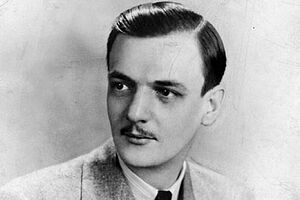André Laurendeau facts for kids
Quick facts for kids
André Laurendeau
|
|
|---|---|

André Laurendeau
|
|
| Born |
Joseph-Edmond-André Laurendeau
March 21, 1912 |
| Died | June 1, 1968 (aged 56) |
| Occupation | Journalist, politician, and playwright |
André Laurendeau (March 21, 1912 – June 1, 1968) was an important figure in Quebec, Canada. He was a journalist, a politician, and a writer of plays. He also helped lead a special group called the Royal Commission on Bilingualism and Biculturalism. This group looked at how English and French languages and cultures could live together in Canada. André Laurendeau was active in Quebec for about 30 years. His work happened during some very busy times in Canadian history.
Contents
Growing Up in Quebec
André Laurendeau was born on March 21, 1912, in Montreal, Quebec. His family was well-known in Quebec. He was the only child of Blanche Hardy and Arthur Laurendeau. Their home was full of music and politics, and it was also very Catholic. His father, Arthur, was a strong supporter of Quebec's unique identity. André grew up looking up to people like Henri Bourassa, who started the newspaper Le Devoir, and the historian Abbé Lionel Groulx.
André finished school at Collège Sainte-Marie in 1931. He didn't go to university right away because he faced some personal challenges. The fact that he became an adult during the Great Depression, a time of economic hardship, really shaped his ideas about society.
In 1933, Laurendeau and some friends from the University of Montréal started a group called "Jeune-Canada". This group wanted to create a special homeland for French Canadians called "Laurentie". While with Jeune-Canada, Laurendeau helped organize a rally. Later in his life, in 1963, Laurendeau wrote an article in Maclean's magazine. In it, he said that this time in his youth was full of uninformed passion.
André Laurendeau's Career
In 1935, André Laurendeau left Quebec with his wife to study philosophy and social sciences in Paris, France. After studying abroad, he changed his mind about Quebec becoming completely separate. He started to worry more about American culture influencing French-Canadian culture than about English Canada.
When he came back home, he became the director of L'Action nationale magazine from 1937 to 1943 and again from 1949 to 1953. His father had directed this magazine before him. As a journalist, Laurendeau wrote about many topics. These included Quebec's identity, World War II, and how Canada's different parts worked together. He also wrote about the idea of two official languages and cultures. He always wrote from a viewpoint that cared about the good of everyone. He was also careful about people who wanted too much power. Laurendeau believed that even though Quebec was a minority in Canada, its unique culture should be respected. He felt it should not be weakened by the central government in Ottawa.
Entering Politics
In 1942, Laurendeau got involved in politics. He was against conscription, which meant forcing people to join the army. He joined a group called the Ligue pour la défense du Canada. He did this because Prime Minister Mackenzie King had promised not to force conscription. But then the Prime Minister asked Canadians if he could change his promise.
Laurendeau later helped start a political party called Bloc populaire Canadien. He soon became its leader in Quebec, while Maxime Raymond was the federal leader. Laurendeau was a Member of the Legislative Assembly of Quebec (MNA) from 1944 to 1948. He represented the Montréal-Laurier area.
Editor of Le Devoir
In 1947, Laurendeau became a top editor at Le Devoir newspaper. By 1957, he was the main editor-in-chief. As editor, he was known for speaking out against Maurice Duplessis, who was the premier of Quebec. Later, he became a leading voice for Quebec's growing sense of identity during the Quiet Revolution. This was a time of big changes in Quebec.
He also helped make the word "joual" popular. This word describes a certain way of speaking French in Quebec. From 1953 to 1961, he hosted a TV show called Pays et Merveilles on Radio-Canada.
Royal Commission on Bilingualism and Biculturalism
From 1963 until he passed away, Laurendeau was a co-chair of the Royal Commission on Bilingualism and Biculturalism. He shared this role with Davidson Dunton. This job brought him some criticism from his friends who strongly supported Quebec's independence. Some historians believe the stress from this criticism contributed to his early death.
André Laurendeau cared a lot about the education and future of young people. Schools in Saint-Hubert, LaSalle, and Ottawa were named in his honor.
Works
- L'abbé Lionel Groulx, 1939
- Voyages au pays de l'enfance (récits) (1960)
- La crise de la conscription 1942 (essai) (1962)
- Une vie d'enfer (roman) (1965)
- Ces choses qui nous arrivent. Chronique des années 1961-1966 (1970)
- Théâtre (1970)
- Journal tenu pendant la Commission royale d'enquête sur le bilinguisme et le biculturalisme (1990)
See Also
Images for kids


